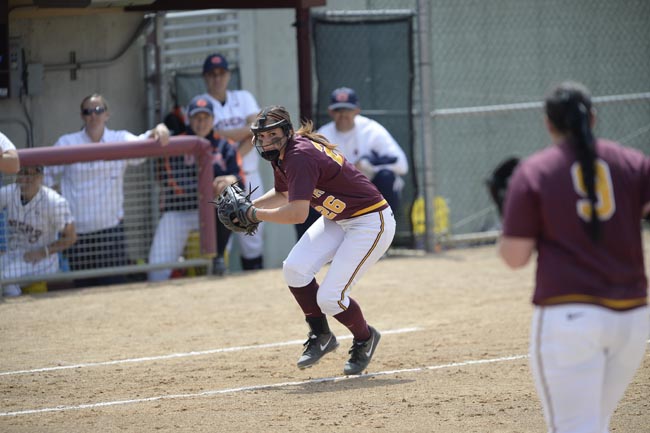CONFIDENCE AND COMPETITIVENESS IN AND OUT OF THE CLASSROOM
Regardless of sport, school or business tract, student athletes at b-schools already possess several mentalities that are attractive to employers—drive, competitiveness, time management, and team orientation. “Carlson cultivates a business-like atmosphere,” says Richardson. “That business-like atmosphere is also reflected on the field. Both worlds have a level of competitiveness and are achievement-oriented.”
Carter says Ross does not have as many student athletes as other schools because of the time demand placed on Ross students. The athletes that are enrolled at Ross fly under the radar. “They are not getting special treatment and blend in with the other students,” says Carter. “If you didn’t ask them about their sports, you would never know they were athletes.”
What does distinguish them from their peers, according to Carter, is their confidence and competitiveness. “You really have to be confident or you will not be a very good athlete,” Carter says. “If you think about what makes a salesperson good, it is confidence and competitiveness. Athletes are obviously highly competitive as well.”
Jacobson agrees with the application from classroom to baseball field.
“I think there is real-world application to being a student athlete,” Jacobson says. “You learn how to perform under pressure and how to interact with teammates with diverse backgrounds and interests.”
For Richardson, Carlson and her spot on the softball team work congruently to make her a strong job candidate. “Carlson cultivates a business-like atmosphere and the competition amongst students really reflects that,” Richardson says. “The nature of going into management and business reflects competing in sports. Both are achievement oriented and both offer opportunities to create change.”
PERSEVERANCE AND DRIVE THROUGH THE SETBACKS
Richardson also says being able to work successfully on a team and handle setbacks are lessons athletes learn on a daily basis. “You are going to have to work with people you are not always around,” says Richardson. “We have 22 different girls on the team each with different personalities and backgrounds. It has taught me how to truly understand the meaning of teamwork.”
Richardson has dealt with multiple injuries and the process of rehabbing and coming back from those injuries. “It’s about being faced with adversity and dealing with injuries and setbacks and having the discipline and work ethic to bounce back,” Richardson says. “That is both on a team and personal level. A bad grade isn’t the same type of adversity as an injury but they can be responded to in the same way.”
Mark Murphy, also known as “College Football’s Smartest Player,” just finished his last season playing safety for the Indiana Hoosiers. He’s built his own desktop computer and is interested in pursuing a career in big data and analytics. What he learned during his time at Indiana’s Kelley School of Business and playing Big 10 football is there is no substitute for hard work.
“There is a time for work and there is a time for play,” Murphy says. “You have to get your work done. Learning how to do something takes a lot of time. To get something out of a project or play, you have to put enough time and work into it.”
GOING PRO IN BUSINESS
And possessing deft business skills and work ethic is important considering very few of these student athletes will become professional athletes. “Our career services office does a great job and places more than 95 percent of our graduates,” Carter says. “Over the years I have been teaching, maybe 10 percent of my students have been athletes. I think maybe two have gone into the NFL. There just isn’t a high probability of competing professionally.”
Many athletes realize this and many have dreams outside of professional sports. Lao wants to work in consulting before starting her own business that she hopes will connect academics and athletics in Hong Kong. Miller would like to work in real estate before also starting her own company focused on farm leadership. McGee-Stafford wants to work in accounting, Bain dreams of working at World Bank, and Richardson has plans for employment in human resources and industrial relations.
Perhaps the craziest pipe dream?
“I would love to say my dream is to win a World Series with the Cubs,” Jacobson says. “But I’ll probably just look for a job. I have learned a lot about real estate with the real estate development company I interned with the past two summers.”
Smart choice.
The truth is, many of these athletes could go professional in their respective sports but wouldn’t earn as lucrative of a living compared to a business degree. “I want to go pro but I always have these nagging injuries,” says McGee Stafford. “Plus, the WNBA doesn’t pay enough to make it a career. I’m going to graduate with a master’s degree and sit for the CPA exam. Placement is like 98 percent if you have your CPA.”
Stecklein agrees.
“It’s really not a lucrative option,” Stecklein says. “There is a professional Canadian and American hockey league for women and I’d like to play in another Olympics, but that’s not enough to survive.”
These student athletes and many others have bigger plans and dreams outside of athletic competition. And degrees from these prestigious schools will help make those dreams come to fruition.
DON’T MISS: HOW STUDENTS RANK THEIR SCHOOLS or THE VERY BEST COLLEGE TOWNS












Questions about this article? Email us or leave a comment below.